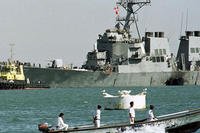In June 1944, Allied planners considered how to keep the foothold they'd gained on the continent. They recognized that, without functional deep-water ports, landing supplies would be impossible. Coast Guard Lt. Cmdr. Quentin R. Walsh, a member of the Logistics and Planning Division for the U.S. Naval Forces, stepped up to the plate and did the impossible, securing the French port of Cherbourg with a gambler's bluff.
Cherbourg had been rendered nearly unusable by the Germans: its canal gates were destroyed, its railroad yard razed, and the port itself was strewn with mines and booby traps set in sunken vessels. Walsh headed a 50-man reconnaissance party tasked with scouting the port and readying it for inbound shipments.
According to Coast Guard Commandant Adm. James M. Loy, Walsh's job was complicated by "a few inconvenient facts: like the house-to-house street fighting ... the German control over half the city ... and a fort that gave them total possession of much of the port." Walsh fought his way to the German arsenal and took over 400 enemy prisoners.
No matter how many prisoners he'd captured, however, there still remained the matter of Fort du Homet, the German stronghold above the port. Walsh forced a captured officer to lead his small party through a minefield and to the fort, where he had heard that more than 50 American paratroopers were being held captive.
At the entrance to the fort, Navy Reserve Lt. Frank Lauer, knowing the fort's defenders had not yet surrendered, questioned his superior about the wisdom of trying to storm a stronghold with a handful of men. "Walsh responded first by asking the lieutenant if he had ever played poker and second by raising a white silk handkerchief as a sign of truce," Loy recounts. Once inside, the two men convinced the Germans that the city had already fallen, and that they had come to accept surrender of the fort.
Walsh, no doubt a mean poker player, negotiated the release of the 50 paratroopers and the unconditional surrender of both the fort and its 300-plus troops. For his myriad actions that day, Walsh was awarded the Navy Cross.
Related links:












